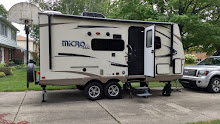Per
Carol and Macel’s recommendation, we wanted to stop by Callaway Gardens, where
the azaleas were at peak bloom (a month early), and Roosevelt’s “Little White
House”, in nearby Warm Springs, GA. We hoped to do both and make it to the south
side of Nashville to stay the night. It was a cooler day and partly sunny but
we packed a picnic for lunch and, despite having to re-winterize the camper,
got on the road before 9:30. When we arrived at Callaway Gardens we were
surprised at the immensity of the resort and all there was to do there. We
could have spent the day riding our bikes on the miles of paved trails, but had
to limit ourselves to seeing the Azalea Bowl. Here is their description of the
Bowl:
“This
40-acre garden is home to more than 3,000 native and hybrid azaleas, which
explode into a colorful palette of pinks, reds, lavenders and whites each
Spring. Additional plantings include 2,000 trees and shrubs that provide an
array of foliage and blooms throughout the year. With wide walking paths that
criss-cross the hillside gardens, the Callaway Brothers Azalea Bowl is a
delightful spot for a leisurely stroll in any season.…The Callaway Brothers
Azalea Bowl is named in memory of brothers Fuller Earle Callaway Sr., and Ely
Reeves Callaway Sr. Fuller Callaway was the father of Gardens founder Cason J.
Callaway. Ely Callaway was the father of the late Ely Callaway Jr., founder of
Callaway Golf. Ely Callaway Jr. funded the garden with a $3 million donation,
and it opened in 1999.”
At
the other end of Falls Creek Lake was the lovely chapel with its four seasons
of stained glass windows. There were very few people around and we enjoyed
walking the area very much. The many trees and rolling hills make the garden
seem very natural and woods-like. We went to the Information Center to eat our
picnic lunch and then had to drive on to our next destination.
 |
| The upper garden was more formal than the Azalea Bowl. |
 |
| The pansies smelled delightful but the daffodils in this border hadn't bloomed yet. |
 |
| The azaleas shone through the woods from an overlook as we descended the hill. |
 |
| One of the falls tumbling down the hills toward the lake. |
 |
| The Four Seasons in stained glass |
 |
| Ida Cason Callaway Memorial Chapel would be a lovely setting for a wedding! |
 |
There were all shades of pink and red but so far no one has
developed yellow or blue azaleas. |
 |
| Although the blooms didn't have much fragrance they were full of bees. |
 |
| Add caption |
 |
This was our view for our picnic. Our only company was a
pair of hopeful Canada Geese. |
Roosevelt’s
Little White House is a State Historic Site and it really impressed us with its
simplicity. This was where he stayed when he visited the Therapeutic Complex he
designed and founded to treat people suffering from Polio, as he did. There was
a nice Museum with a film narrated by Walter Cronkite, the complex of three
buildings, and our receipt got us in to see the nearby warm springs complex,
which is no longer used. We enjoyed it very much and then made it to Nashville
to stay the night.
 |
The small building on the right was servants quarters for the three local helpers who stayed
while Roosevelt was visiting. The small building on the left was a guest cottage. They were
as modest as the Little White House, seen below. |
 |
| Butler's Pantry |
 |
| Roosevelt was sitting in this chair when he had the stroke that killed him nearly immediately. |
 |
| This repurposed kitchen chair on wheels was easy to get around the house. |
 |
This unfinished portrait wasn't completed after stroke. Years later the artist completed
an nearly identical portrait and donated it to the Roosevelt estate. It hangs near the unfinished one. |
 |
| Roosevelt and an architect designed the three pools of the Therapeutic Institute. |
 |
The pool in the foreground was covered with glass. The one in the middle was for
play and there are many films of Roosevelt roughhousing with children in that pool.
There is a small trough in that pool where one can feel the water as it comes from the spring.
The far pool was for intensive therapy in the 88 degree waters, which were particularly
buoyant, but we never understood why since they were not mineral water.
|

























No comments:
Post a Comment